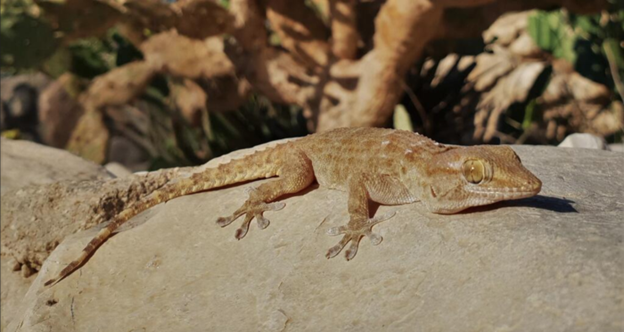
Egyptian geckos have invaded Israel, devoured crops, and threatened the ecological balance in Wadi Araba
Israeli Nature and Parks Authority (INPA) says it is seeking help from residents of Wadi Araba following an invasion of Egyptian geckos, which have spread across the Dead Sea basin region and are multiplying at an alarming rate.
The geckos, a type of lizard, are considered to be disruptive to the local ecosystem and have been seen devouring crops.
Israeli authorities are hoping locals will be able to locate the creatures.
“If you have areas with street lights or any other type of light that attracts insects, or areas where you might see an Egyptian gecko, please photograph it with your phone and share it with us,” Israel’s environment protection ministry said in a statement.
The Egyptian gecko is often characterized as being particularly fearsome for a gecko. It has, on occasion, been known to eat small birds.
Professor of science at Tel Aviv University, Shai Meri has warned that geckos have the potential to cause massive damage to any ecosystem.
“The Egyptian gecko can eat anything it is able to overcome. In North Africa, it was recorded eating a gerbil. It also eats other geckos and arthropods and is a potential danger to anything that lives in its habitat and is smaller than it,” said Meiri.
Egyptian lizards were spotted eating small birds, Meri continued, adding that they are considered a very aggressive species which bite hard and reproduce in a fast life cycle.
Miri’s assessment confirmed that the Tarentola annularis had eliminated all local geckos and had become a threat to the environmental situation.
Al Jazeera questioned the Israeli environment ministry’s statement, referring to the gecko as a “small reptile” and asking if it really looked capable of “devouring a gerbil”.
“Israeli news reports sparked ridicule on social media, after warning of the spread of the Egyptian gecko and its danger to the ecosystem,” the report read.
In turn, the Environmental Protection Agency issued a brief statement, which says:
“If you have areas with street lights or any other type of light that attracts insects, or areas where you can see an Egyptian gecko, please take a photo of it with your phone and share it with us.”



